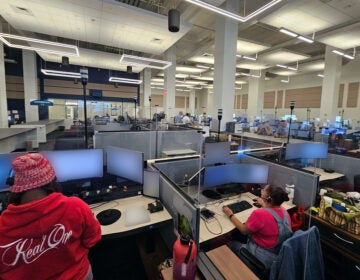Group makes fourth trip to Harrisburg to lobby for “Second Chance” Bill
Reuben Harris was told it wouldn’t make a difference had he gotten his Ph.D; he still wouldn’t be able to get a job.
The 56-year-old has been incarcerated twice for shooting at people. The first time, he spent two years in jail with 12 years of probation, but after the second shooting, he served 13 years. That record prevents him from finding employment and attending college.
“All of them are well over 10 years old, and I’m still haunted by that,” Harris said of his felonies while en route to Harrisburg earlier this week as a part of a group lobbying for changes to the state’s expungement laws.
He submitted an application for Delaware Valley College in hopes of pursuing his dream of working in the medical field. They rejected him after learning of his criminal background. He has had the same experience with employers who, he says, either reject him or claim to put him on file and never contact him.
“I’ve had an opportunity to look over my life and the choices I’ve made. I’ve had an opportunity to realize the hurt and harm that I’ve caused. I’ve done all that I can to do a 180 degree turn,” Harris said.
A common purpose
Groups like X-Offenders for Community Empowerment (for men) and Why Not Prosper (for women), both run by formerly incarcerated executive directors, have taken initiative to challenge the stigma associated with hiring former criminals.
Why Not Prosper, founded by Rev. Michelle Simmons, is a nonprofit halfway house and resource center helping women before and after their release from prison. Since Rev. Simmons’s first client in 2003, the organization has had 55 graduates out of 93.
One of those graduates, Malissa Gamble, started her own nonprofit for formerly incarcerated women, The Time is Now to Make a Change. Both Rev. Simmons and Gamble have helped women find jobs, affordable housing, reunite with their families and avoid relapse.
Lobbying for change
On three occasions, they have traveled to Harrisburg to lobby for the “Second Chance” bill (Senate Bill 1220), which aims to expand Pennsylvania expungement laws. The prime sponsor is state Sen. Tim Solobay (D-Canonsburg), but it has been heavily supported by state Sen. Shirley Kitchen, whose district includes portions of Lower Germantown, Roxborough and East Oak Lane.
Under current Pennsylvania law, an ex-offender may only have his or her record expunged after reaching 70 years of age and having remained free of arrest or prosecution for 10 years. Formerly incarcerated people who have been dead for three years are also entitled to expungement.
On Tuesday morning, members of the three nonprofit groups made a fourth trip to the state capital for lobbying purposes.
Door by door, the group of 10 that split into smaller numbers and visited numerous senatorial offices to discuss their support of Second Chance legislation. Several chiefs of staff spoke on behalf of senators who were unavailable.
What they’re seeking
The group explained to senators and their staff that the Second Chance bill would help the formerly incarcerated find employment by expunging their old and minor convictions. Under the bill, an individual with a second degree misdemeanor could expunge the offense if he or she was not arrested for 10 years after the final release from supervision on the case. It would also allow a person convicted of a third degree misdemeanor to expunge the offense if he or she was not arrested after seven years of final release from supervision.
A few exceptions to the bill would include denying expungements to second and third degree misdemeanors if they were convicted of any first degree misdemeanor or felony. He or she would also be denied an expungement if they were convicted of simple assault, indecent assault or gun charges.
The group was also sure to mention Tuesday that 13 states including California, Rhode Island and Texas, have already expanded their expungement laws. Arkansas now allows all misdemeanor convictions to be expunged with a five-year waiting period for more serious misdemeanors.
For the past eight years, Kitchen has advocated for more lenient second-chance laws for non-violent ex-offenders. On a previous Second Chance lobby day, supporters discussed “ban the box.” Outgoing eighth district City Councilwoman Donna Reed Miller sponsored the legislation which advocates for employers to remove the box from job applications that asks if an individual has been convicted of a crime. The bill passed city council and is currently in the hands of the Senate.
The economy doesn’t help matters
The bad economy has only exacerbated his circumstances of finding employment. Those formerly incarcerated are now competing with people with college degrees who cannot find jobs.
The situation has proven especially frustrating for non-violent formerly incarcerated individuals like Jennifer Zepp, 26, who was locked up for five days for stealing baby formula.
“I’m not a bad person. I’m not a repeat offender,” she said. “When I go get jobs, they look at me differently now.”
WHYY is your source for fact-based, in-depth journalism and information. As a nonprofit organization, we rely on financial support from readers like you. Please give today.




